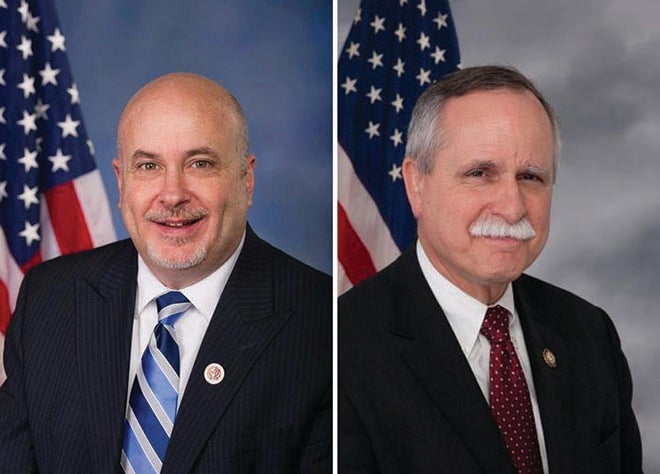Uncategorized
Talking Trade

Teamster magazine interviewed two members of the U.S. House of Representatives, one Democrat and one Republican, on trade issues. Rep. Mark Pocan, a Democrat, represents Wisconsin’s second congressional district, and Rep. David B. McKinley, a Republican, represents West Virginia’s first district.
Why is trade policy important to American workers?
REP. POCAN: It is critical we put a priority on American jobs and ensure workers have access to reliable, family-sustaining employment. Our trade policies must protect American jobs and promote products made here in the United States.
REP. MCKINLEY: We live in a global economy and what happens half way around the world can have an impact on Main Street in your hometown. Rather than ensuring America competes on an even playing field with foreign countries, too often our trade policies have given foreign countries unfair advantages, resulting in job losses and lower wages. While negotiations over workers’ rights and intellectual property in Vietnam and other countries may seem far away from the everyday concerns of most families, trade policy can have a very real impact on their future.
How has NAFTA harmed working families?
REP. MCKINLEY: The legacy of NAFTA is fewer manufacturing jobs and stagnant wages. An estimated 700,000 good paying manufacturing jobs have left America, while wages for the average American family have been stagnant since the mid-1990s when NAFTA took effect. These jobs have largely been replaced with lower wage service industry jobs. Any future trade agreements similar to NAFTA must be scrutinized for the impact they will have on American working families. We can’t build our economy on part time wages. A thriving middle class is important for our country and NAFTA and other unfair trade deals have hurt that.
REP. POCAN: NAFTA has had a devastating impact on our manufacturing industry and working families across America. According to the Bureau of Labor Statistics, 5 million Americans have lost manufacturing jobs since the passage of NAFTA. Meanwhile, as a small business owner, I’ve seen the number of American-made products dwindle since the agreement was passed.
What should our elected representatives be doing to protect American workers with regard to trade?
REP. POCAN: Too often we see politicians supporting policies that ship jobs overseas, leaving American workers in the dust. We need elected officials who will stand up for job-creating policies to protect workers and support American manufacturing.
REP. MCKINLEY: America’s elected leaders need to listen to the concerns of their constituents. We hear often from businesses and workers who bear the brunt of unfair trade. We have listened and stood up for them by opposing unfair trade agreements. As we begin 2015, the next big fight is on Trade Promotion Authority being sought by President Obama. This authority would make it easier to finalize large-scale trade agreements with Asian and European countries, and minimize the input Congress can have. If we can prevent Trade Promotion Authority from passing Congress, it will be harder to push through TPP and TTIP.
How can Teamsters make their voices heard in this debate?
REP. MCKINLEY: You can count on the pro-free trade supporters making their voice heard in Washington, so it’s imperative your members weigh in with their elected representatives. Whether it’s a phone call, letter, email, or meeting in the district or in Washington, Teamsters should make sure their members of Congress understand the impact unfair trade has on jobs in their districts. There is a lot that readers of this magazine and rank-and-file members can do to make their voices heard, and I hope they speak up in this debate.
REP. POCAN: Teamsters must continue to stand up to the special interests who promote trade agreements that hurt workers. We need a large grassroots presence standing in opposition to harmful trade agreements and the Teamsters serve as a critical voice in support of our middle class.
Do you see similarities in how TTP and TTIP are being sold to Americans with how NAFTA was sold?
REP. POCAN: Just like NAFTA, TPP and TTIP are being rammed through Congress with the use of Fast Track Authority, thus shutting down necessary discussion over concerns ranging from the protection of American workers to human rights abuses abroad. Each of these deals extends far beyond traditional trade business, and the American people deserve a thorough debate over whether these agreements are in the best interest of the United States.
REP. MCKINLEY: When NAFTA was being sold in the early 1990s there were many grand promises made about the benefits of free trade with Mexico and Canada. The potential negative effects on jobs were downplayed. The same arguments are being used today. Also, “fast track” trade authority was used to pass NAFTA as well. By giving the President sole discretion to carry out trade negotiations, Congress has made itself a rubber-stamp for decisions made by the Executive Branch. Americans should demand their elected representatives write their laws, not one person in the White House.
Giving unsafe Mexican trucks unfettered access to U.S. highways was a component of NAFTA that the Teamsters are still working to halt more than 20 years after NAFTA’s passage. What should that tell people about these trade agreements?
REP. MCKINLEY: The fact that we’re still trying to address problems with NAFTA more than 20 years later should be a reminder that the consequences of trade agreements—whether intended or unintended—are long-lasting and difficult to undo. Rather than trying to go back and fix these problems after the fact, we should stop unfair trade deals before they even happen. That’s our opportunity this year and we will need your help.
REP. POCAN: This example highlights the need for aggressive examination of how trade agreements impact the livelihood of families both in the United States and abroad. It is unacceptable to implement policies lacking the type of rigorous oversight necessary to maintain our safety and security.